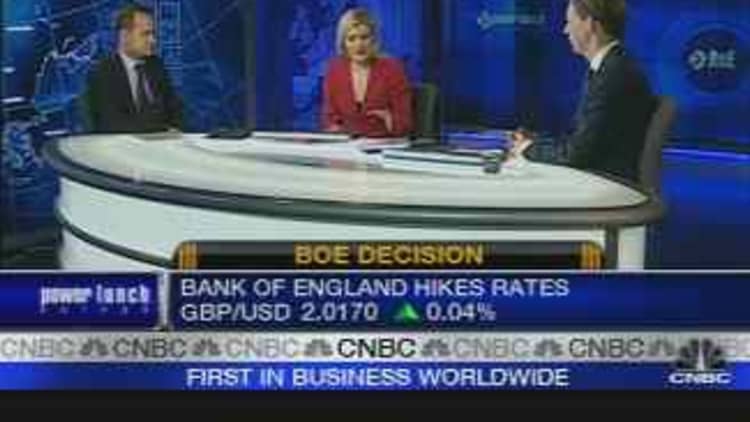The European Central Bank kept interest rates steady at 4% Thursday, as widely expected.
"Risks to price stability in the medium term remain on the upside," Trichet said in a press conference following the announcement, while refraining from using the codeword "vigilance." The statement left the probability for a rate hike in the next meeting low, but left the door open for hikes later in the year.
Trichet traditionally uses "vigilance" when talking about inflation to signal an imminent rate hike.

The next ECB rate hike is expected to be in September or October, according to 93 analysts surveyed by Reuters ahead of the announcement.
Trichet indicated that the current expectations of many economists for the ECB to hike in October is on target.
"No change in the market expectation is in the message of the governing council, but as you know we never pre-commit," Trichet said when asked at the press conference if an October hike was still likely.
The ECB has raised rates about once every quarter since December, managing to keep inflation at bay and growth from stalling.
Unemployment in the euro zone is at a record low of 7%; inflation remains around the bank's target of "close to but below" 2% across the 13-nation region of more than 317 million residents who account for more than 15% of the world's economic production.
Still, with housing costs cooling off and mixed reports on German investor and business confidence, some experts wonder whether further increases are in the cards beyond September, when the ECB is expected to lift rates to 4.25%.
BOE Raises Rates
The Bank of England raised overnight lending rates by a quarter point Thursday to 5.75%, as expected. It is the fifth hike since last August and continues the Monetary Policy Committee's strategy of cooling inflation.
"The margin of spare capacity in businesses appears limited and most indicators of pricing pressure remain elevated," the BoE's Monetary Policy Committee said in a statement.
"The bank is obviously concerned that current inflation pressures and the sense of pricing powers that companies have is quite elevated, which is why they've moved today, Andrew Bell, European strategist at Rensburg Sheppards, told "Power Lunch Europe," adding, "there's a chance they'll do a back-to-back move next month."

